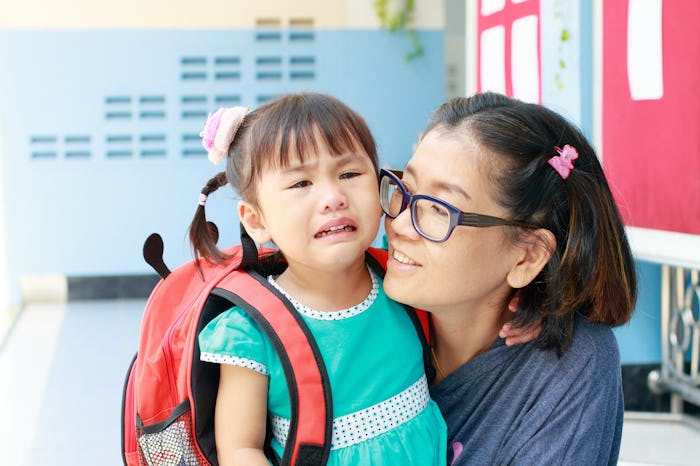Life
Here's How Long Your Kid's Clinginess Will Last Now That They're Back In School
Whenever your little kids have been away from school or daycare for awhile, you may notice that they get a bit clingier when it's time to go back. It can be just as hard on the parents who have to watch their little one get so upset and leave them as it is for the kiddos who just want Mom, Dad, or Grandpa to stick around all day. You might expect it on the first day or even for the first few, but once it's gone past that you might be asking, how long does the clingy phase last when kids go back to school?
Luckily for kids and parents alike, that clinginess that can resurface on occasion shouldn't last long, experts say, though the exact length of time can vary depending on what sorts of factors spurred your kid to get clingy again in the first place.
"Clinginess can happen almost overnight and every child is different, but typically, the clinginess phase peaks when your child is a toddler, sometime between 12 and 24 months," Dr. Laura F. Dabney, MD, a psychotherapist, tells Romper by email. "They typically 'relapse' around pre-school age, but, fortunately, this will only typically last a few weeks at most."
If your child's clinginess is due to current events, things happening at home, or anything that scares, worries, or upsets them, their clinginess might be a bit different and the timeline might vary as well.
"These days, when kids return to school and activities, there is more clinginess than ever because they have more separation anxiety," Dr. Carole Lieberman, MD, a psychiatrist and the author of Lions and Tigers and Terrorists, Oh My! How to Protect Your Child in a Time of Terror tells Romper by email. "Kids are aware and confused by the media coverage they have been seeing about scary things in the world — from terrorists to school shooters to hurricanes. Scary things make kids regress, so that they behave in ways they used to act when they were younger. For example, they might start wetting the bed, or crawling into bed with you, or becoming more clingy."
Lieberman suggests that you try to encourage your kids to talk about what's making them upset or scared or sad or why they're otherwise having a hard time letting go of you or being away from you. That way, you can address their fears or concerns rather than dismissing or shaming them for having those fears in the first place.
And if your child seems to be more sad about leaving you after spending more time with you all summer long, thinking about your goodbyes and routines might help.
"Make sure goodbyes short and sweet, stay firm, and try to refrain from dragging it out longer than it needs to be," Dabney says. "You can develop a ritual by each time saying 'I love you' and giving your child two kisses. You can also help by giving an ETA using events instead of time such as, 'I'll pick you up after snack time or after nap.' Do your best not to cave in; more than anything a child needs structure and routines because these make a child feel safe and thus will reduce clinginess. Further, routines can help ease feelings of separation anxiety and help with emotional stability."
It can be concerning to some parents when their kids seem to cling to them rather than get excited to run off and be with other kids, but it's not always a sign of something about which you truly need to worry. "Clinginess is a sign that [they have] developed a healthy, loving relationship with you; it's nothing to panic about and certainly nothing you need to 'get rid of,'" Dabney says. Knowing what sorts of things that you can do to help your child going through a phase of clinginess is good, but unless there are other things that are making you worry, remember that it's a phase that lots of kids go through and that it will — eventually — pass.
